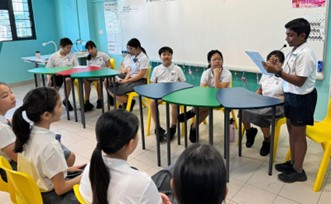English
English Language Curriculum at ALPS
At ALPS, our English Language curriculum is designed to develop students into empathetic communicators, discerning readers, and creative inquirers. We have been progressively implementing the national Strategies for English Language Learning and Reading (STELLAR) 2.0 programme since 2020, starting with Primary 1. This phased approach now covers all levels from Primary 1 to 6. STELLAR's vision is to cultivate a love for reading and a strong foundation in the English Language. By employing engaging, age-appropriate strategies and instructional materials, we aim to develop students' language proficiency and promote a lifelong positive attitude towards reading and writing.
In alignment with the 2020 English Language Syllabus, our curriculum focuses on developing both effective and affective language use among students, with an emphasis on Purpose, Audience, Context, and Culture. The syllabus emphasises 21st century competencies, fostering values such as empathy and cultural sensitivity. Our teaching approaches incorporate metacognition, multiliteracies, and inquiry through dialogue. To enhance critical thinking, teachers employ questioning techniques based on Bloom’s Taxonomy, encouraging students to engage deeply with the content and apply their thinking to real-world contexts.

HIGHLIGHTS FOR PRIMARY 1 & 2
Drama and Theatre Experience
Primary 1 and 2 students have the opportunity to learn drama techniques and enhance their storytelling skills through an engaging programme that culminates in a student performance, showcasing their creativity and learning. As part of this experience, students also attend a live drama performance by professional actors, where they explore plot, storyline, and character development through live theatre. To extend their learning, students read books related to the play and write a recount of their experiences, allowing them to reflect on what they have learned. This enriching experience not only deepens their appreciation for drama but also supports their learning in the English Language curriculum.

Literature Is For Everyone (LIFE) Programme
The LIFE Programme, targeted at Primary 1 and 2 students, introduces them to quality literature to develop language skills and empathy. Through guided interactions with stories, students learn language models, experience the world through characters, and appreciate the elements of compelling narratives. This programme not only enhances language proficiency but also builds metacognitive skills by encouraging students to reflect on the characters' experiences and apply these insights to their own lives.
Each year, Primary 1 and 2 students participate in a five-lesson module featuring a selected book. Primary 1 explores Frog and Toad Are Friends by Arnold Lobel, while Primary 2 focuses on Freckle Juice by Andrew Clements. Through these lessons, students engage in activities that deepen their understanding of the story's themes and characters, fostering a love for reading and thoughtful reflection.
Read with Your Child (RWC) Programme
The Read with Your Child (RWC) Programme is designed to nurture a love for reading in Primary 1 and 2 students while fostering meaningful parent-child bonding. Starting from Term 2, students will receive a folder containing a series of curated books and an activity card. Together with their parents, students will read the books and complete the accompanying activities throughout the term. Upon completing the activity card, students can exchange it for a Reading Badge, celebrating their progress and encouraging continued enthusiasm for reading. This programme also supports the development of important values such as responsibility and resilience through shared learning experiences.
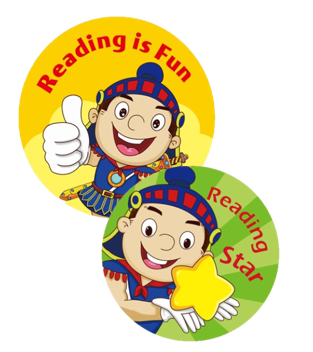
ALPS Oracy Programme
At ALPS, our Oracy Programme is dedicated to enhancing students' speaking and listening skills, enabling them to articulate their thoughts confidently and effectively. We employ school-based thinking frames, sentence starters, and discourse markers to support students in structuring and expressing their ideas clearly.
To further enrich our Oracy Programme, we integrate various digital platforms and tools:
● Moo-O (Primary 1 and 2): An interactive
storytelling application that transforms students into story characters,
promoting reading fluency and speaking skills through engaging activities.
● Singapore Student Learning Space (SLS)
Speech Evaluation Tool (Primary 3 to 6): A feature within SLS that provides
feedback on students' reading aloud, highlighting areas such as pronunciation,
fluency, and accuracy.
● ALPS-Developed Oral Coach (Primary 5 and 6): An AI-powered tool designed by the school to offer immediate feedback on students' oral responses, helping them improve the depth and quality of their conversations.
HIGHLIGHTS FOR PRIMARY 3 to 6
ALPS Writing Programme (Primary 3 to 6)
At ALPS, our Writing Programme is designed to nurture creative thinking and effective writing skills among our students through engaging and structured activities that progressively build their competencies. Students are introduced to Making Thinking Visible routines such as See-Think-Wonder to encourage brainstorming and critical thinking. Students are also introduced to the concept of Show, Not Tell, where they learn to convey emotions and actions vividly through detailed descriptions.
To make storytelling both fun and meaningful, ALPS has developed the ALPS StoryBuilder—a structured system designed to teach storytelling in a progressive manner. This system, introduced to Primary 5 and 6 students, helps them build confidence in their narrative writing. Additionally, we have created Creative Adaptive and Inventive Thinking (CAIT) and Communication, Collaboration, and Information (CCI) activities. These are integrated with the use of mentor texts, providing structured yet flexible opportunities for students to experiment with story elements, refine their writing, and develop their unique voices. By engaging in these activities, students not only enhance their storytelling skills but also find joy and purpose in expressing their ideas creatively.

Literacy Support Programmes
To support students with diverse learning needs, we offer specialised programmes, such as the Learning Support Programme (LSP) for Primary 1 and 2, and the Reading Remediation Programme (RRP) and School Dyslexic Remediation (SDR) for Primary 3 and 4. These programmes, conducted by trained teachers, are designed to provide targeted intervention, ensuring that all students have a strong foundation in reading and comprehension.
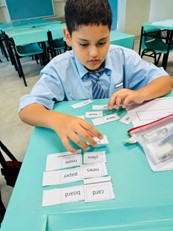
High-Ability Learners Programme for English Language (HAL-EL) at ALPS
At ALPS, our High Ability Learners Programme (HALP) for English Language is designed to cater to students with an aptitude and passion for the language. The programme aims to extend students’ learning beyond the standard curriculum, challenging them to think critically, express creatively, and develop a deeper appreciation for language and literature. Through differentiated instruction, specialised workshops, and participation in national-level competitions, we provide a platform for our high-ability learners to excel and grow into confident communicators and reflective thinkers.
DIfferentiated Learning (Within Curriculum)
The Explorations and Inquiry (E&I) activities are developed and curated by the Ministry of Education’s Gifted Education Branch, with resources designed to stretch high-ability learners (HALs). At ALPS, we adapt these activities where relevant and introduce them during English Language curriculum time for classes with identified HAL students. These activities complement the STELLAR 2.0 English Language curriculum by deepening students' engagement with language through inquiry-based learning. Each STELLAR unit incorporates E&I tasks tailored to its specific focus, challenging students to explore concepts more thoroughly. For example, one unit may involve investigating how technological advancements influence language, while another may focus on the power of persuasive writing or storytelling. By participating in these varied activities during curriculum time, HAL students refine their critical thinking, creativity, and analytical skills, enriching their overall learning experience.
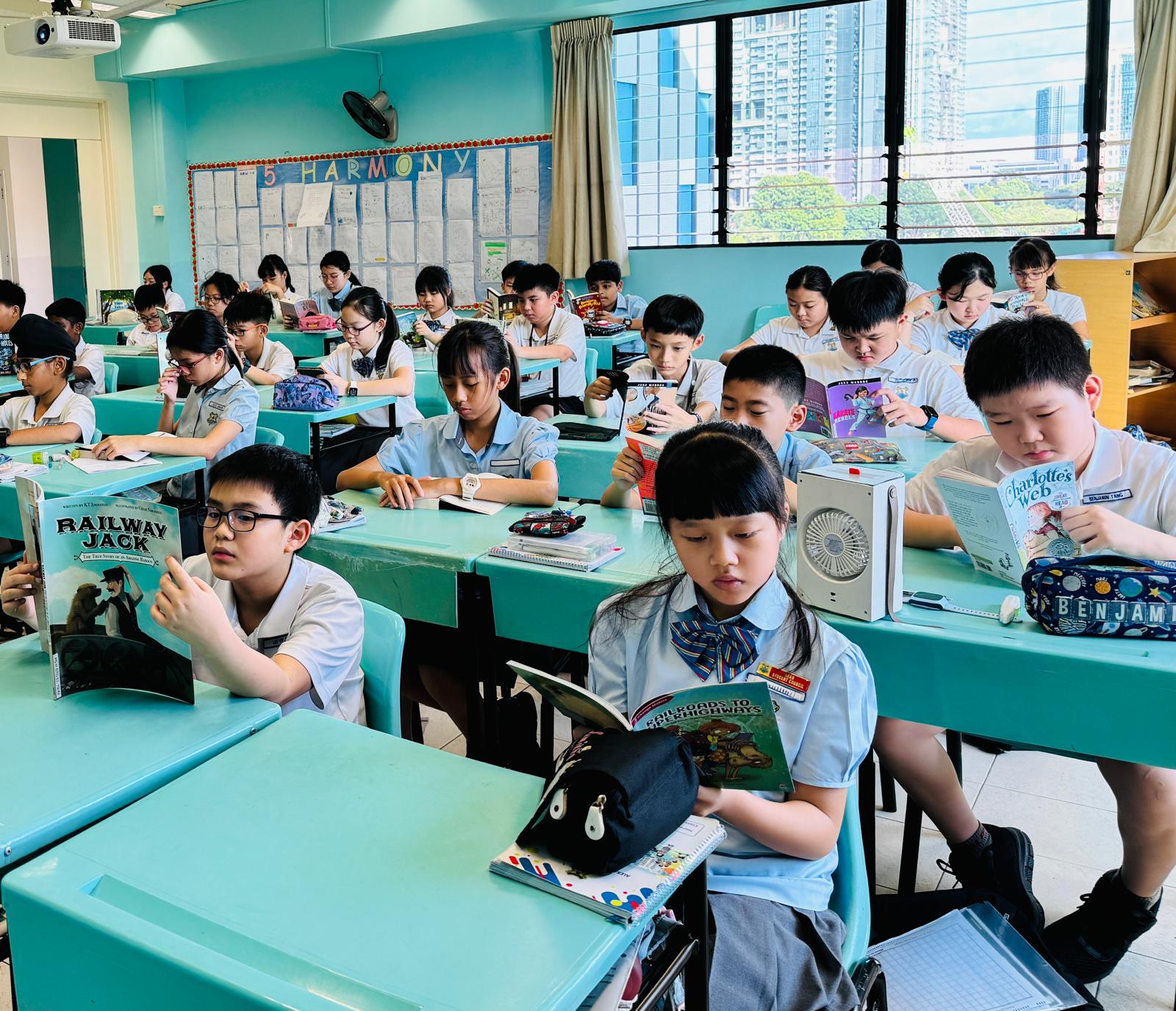
Reading Circles Programme (After-school Enrichment Programme)
Reading Circles for Advanced Readers is a programme designed by MOE Gifted Education Branch (GEB) as an enrichment provision for High-Ability Learners. The programme aims to provide students an opportunity to engage in critical thinking and reflection as they read, discuss and respond to the selected book. Students gain new understanding and perspectives as they construct meaning with other readers.
Participants engage in thought-provoking literary discussions on carefully selected texts: Frindle by Andrew Clements for Primary 4, The Mudskipper by Ovidia Yu for Primary 5, and Number the Stars by Lois Lowry for Primary 6. At ALPS, we have customised the lessons to incorporate opportunities for students to connect literature to real-world experiences, including societal issues and significant world events such as pandemics or conflicts. This approach fosters deeper comprehension, critical thinking, and analytical skills.
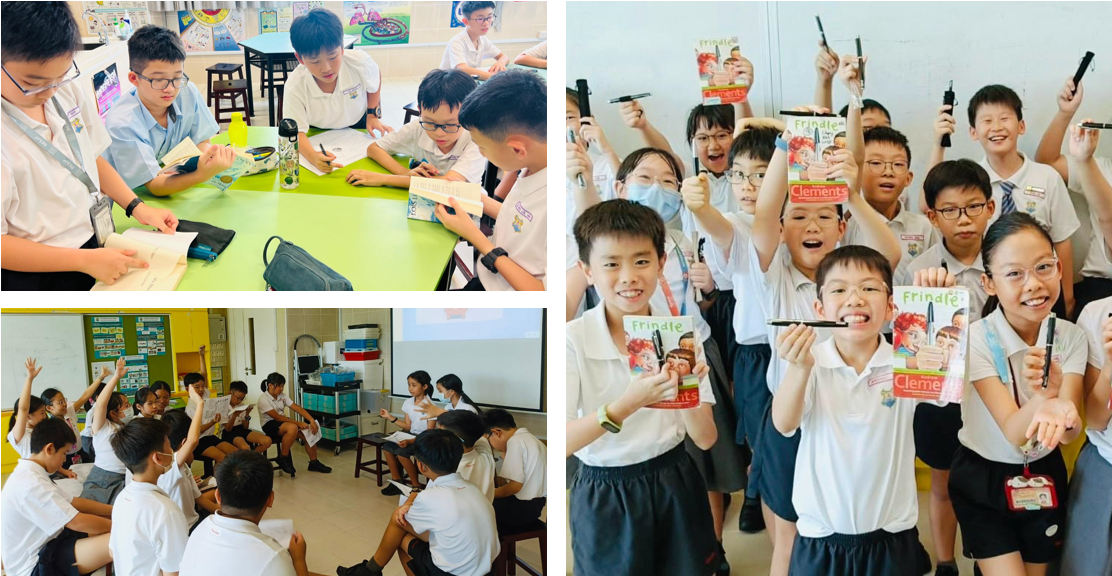
Wits & Words Debate Competition
Tapping on the Ministry of Education’s Gifted Education Branch initiative, ALPS participates in the Wits & Words Inter-school Debate Championship. Towards the end of each academic year, identified Primary 5 students with strong verbal abilities undergo a series of SLS lessons focused on debating skills. From this group, five students will be selected to represent the school in Division 2 of the competition. This programme not only enhances their oral communication and persuasive skills but also builds confidence in public speaking and critical thinking.
